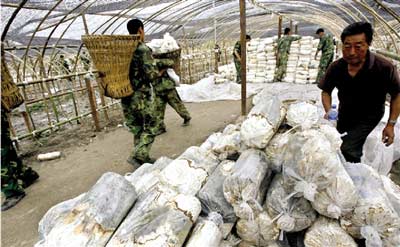
Soldiers of Menghu Division help villagers from Sanguo Town, Qingchuan County to cultivate mushrooms on May 24.
He said that some people started mushroom businesses at the beginning of reform and opening period. "At first I gathered mountain mushrooms only for pocket money when I was very young. Later I began to cultivate with a supervisor and ultimately I put together enough capital to have my own business," he said.
One of Dong's friends sold wild mountain produce from the early 1990s and his business has now expanded to overseas markets.
Before the earthquake Dong was planning to take advantage of the development of tourism to expand his business with a restaurant serving rural food.
The countryside of Qingchuan is rich in delicious black fungus and the government has put in place regulations to protect them. "We became famous for our mushrooms after our county chief held a news conference in Beijing, and the price of mushroom and other wild mountain produce increased because of expanded investment," said Dong Jun.
Dong is clearly characteristic of Qingchuan country businessmen.
As the two dominant industries in the area, wild mountain produce and tourism are the preferred choices of Qingchuan's businessmen. Mushroom cultivation has spread all over Qingchuan and some have started to plant other wild mountain produce such as walnuts and olives.
Xiang Mingyue, who has been in Qingchuan for 43 years, wrote a book of his life there, devoting a large part to Qingchuan's wild mountain produce.
Growing friendship
Although the earthquake destroyed the land, friendship among people grows stronger, Dong Jun said.
Qiaozhuang is the county seat of Qingchuan with a population of 24,000 in an area of 20 hectares.
People know each other well because the town is small and their friendship has grown closer since the earthquake.
In the first 72 hours after the earthquake, survivors were among the first to go to the rescue of other victims. According to Dong Jun, before relief teams arrived, survivors did their best to rescue other victims without regard to their own safety.
Since the earthquake, relationships between couples and between daughter-in-law and mother-in-law have improved, parents are less harsh with children and friends have become even closer. People now understand that nothing is more important than life.
When questioned about future prospects, Dong Jun says that what comforts him is that the mushroom lands were not completed destroyed during the earthquake and most farmers are still alive. "Life will recover if we do not lose confidence," said Dong.
However, Dong is preoccupied with his apartment. "The building I lived in was built earlier than some others and was completely destroyed, whilst others around mine are all still standing now. I don't know how to take up the matter of the poor quality of the building because the debris has been cleared and we no longer have the evidence," said he.
Xiang Mingyue, previously an education officer, believes people should start to take responsibility for those collapsed buildings.
Compared with some collapsed buildings, school buildings in Qingchuan did not fare too badly. During Xiang's period as the Director of Qingchuan Education Commission, he rejected some construction companies' tenders to construct school buildings.
The locals are now also concerned about the relationship between human beings and the natural environment.
Qingchuan experienced severe floods twice in 2005 and 2006. In October 3, 2007, a flood lake was formed in Yaodu town because of landslides. Number 212 National Highway was overwhelmed and the water level rose by 12 meters, placing hundred thousands of residents downstream in danger. The Chinese government provided substantial support to resolve the problem.
Although Qingchuan has suffered many disasters, Dong Jun still feels they are lucky. Thanks to the nature of the terrain, landslides in Qingchuan were not as severe as in Beichuan County where the county seat was almost completely destroyed.
Furthermore, Dong Jun believes life will improve again soon because the wild mountain produce is still there, and his business was not destroyed by the earthquake.
As a part of its reconstruction policies, Qingchuan government announced on May 24 that the first 30,000 residents lived of remote villages would be moved to other areas such as Guangyuan City, Sichuan Province, and Zhejiang Province. The government also made a call for the protection of the local environment.
Most of the mineral extraction industry in Qingchuan has been closed over the last 43 years and replaced with scenic gardens. "Although disasters cannot be prevented, casualties can be minimized if we protect our environment and preserve the balance of nature," said Xiang Mingyue.
(China.org.cn by Yan Pei & Wu Huanshu, June 16, 2008)